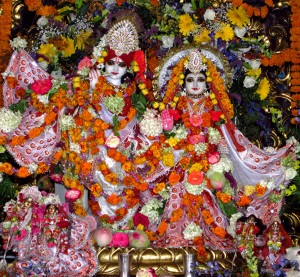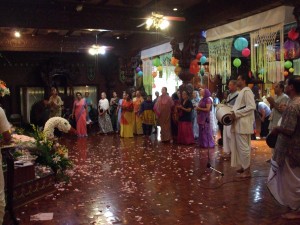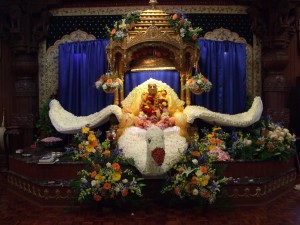Srila Prabhupada Tours His Palace and Gardens in New Vrindaban — June 22, 1976
Much thanks to the Vanipedia website for the transcript.
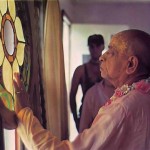
At a New Vrindaban construction site, Srila Prabhupada looks at a stained glass window, 1976.
Prabhupada: Thank you.
Kirtanananda: In New Vrindaban, this is your Palace.
Prabhupada: Oh! So many (indistinct).
Kirtanananda: Yes.
Prabhupada: There is no such building in America. [break] These are our workers?
Kirtanananda: Yes, these are your builders here. Bhagavatananda Prabhu has done the design.
Prabhupada: Oh. Very nice.
Kirtanananda: And Atmabhu Prabhu is the chief construction man.
Prabhupada: Oh, all our men.
Kirtanananda: All our men.
Prabhupada: It is very nice.
Kirtanananda: Your car will come in here, and you get out and come right in.
Prabhupada: And this is the hall?
Kirtanananda: This will be a little hall, and that is the worship room. We can put your vyasasana in there, and you can lecture there, and we can worship you always there.
Prabhupada: Hare Krsna.
Kirtanananda: But this dome will go up another twelve feet, and four feet from the top there is, this lotus flower starts, and this is just one little sample of the kind of casting that will finish it. It will all be done now with smooth plaster. This dome here is being done like this dome, in cement. And then where you see these arches are being poured, there will be colored glass windows, stained glass windows.
Prabhupada: To enter that temple you have to go through here?
Kirtanananda: To enter the Deity room you go through the kitchen.
Prabhupada: No, generally people will go from this side to see the Deity?
Kirtanananda: No, they will see just from out here.
Prabhupada: All these walls closed, there is no window.
Kirtanananda: There is no window.
Prabhupada: Only one window.
Kirtanananda: Four windows on the up.
Prabhupada: Ventilation.
Kirtanananda: Ventilation?
Prabhupada: No ventilation.
Kirtanananda: There will be artificial ventilation, fan.
Prabhupada: Oh. Natural ventilation is prohibited. (laughs)
Kirtanananda: No, these windows can open, air that way.
Prabhupada: Nice veranda. This will be open like this?
Kirtanananda: Yes.
Prabhupada: These are rooms?
Kirtanananda: Yes, these will be servants’ quarters on this side.
Prabhupada: This will be window?
Kirtanananda: Yes. This will be a kitchen.
Prabhupada: Nice, very nice. And there will be garden here?
Kirtanananda: Yes. We are gradually clearing all this land, this was all wooded last year, and we’re clearing now.
Prabhupada: Very nice.
Kirtanananda: It has very good view, all the way around.
Prabhupada: Oh, yes.
Kirtanananda: These are your quarters here. This will be your study room, and there will be a wall there. This is your bedroom.
Prabhupada: These are all marbles? No.
Kirtanananda: Yes, this is all marble. The devotees—you see how the marble is all inlaid on the pieces there—they’ve done that. Then there will be a dressing room and a bath.
Prabhupada: Oh. That side?
Kirtanananda: That side.
Prabhupada: These framework will remain?
Kirtanananda: No, it will be covered with plaster.
Prabhupada: Then it will be taken away? No.
Kirtanananda: No, no, it remains.
Prabhupada: It will continue.
Kirtanananda: You have some question about this?
Prabhupada: This iron is corroding. If it will not hamper.
Kirtanananda: It will be covered.
Prabhupada: Covered, but now it is corroding.
Kirtanananda: I see what you are saying. There is another door that goes in that wall there, like this, for access to that side.
Prabhupada: Svalpam apy asya dharmasya trayate mahato bhayat. Little service in this connection, Krsna consciousness, can protect one from the greatest danger. Svalpam apy asya dharmasya.
Kirtanananda: You are so kind to let us do it.
Prabhupada: Hare Krsna. Krsna’s desire. White sand, where from you secure?
Kirtanananda: In Ohio, about sixty miles from here.
Prabhupada: From the seaside, sea beach? No.
Kirtanananda: No, they call it silica sand. I think it’s made from glass.
Prabhupada: Not glass, it is a kind of stone made powder. Silica sand. They are like sandstone.
Kirtanananda: This is just the first cut, not polished. Now, in this dome you see this is a…
Prabhupada: No, while constructing, filling up this, what is called, column, in Bombay, they’re putting air so that they become solid stone. You have seen in Bombay? Big engineer, they are giving some pumping air so that while the cement is filled up, it becomes solid.
Hari-sauri: Oh, vibrators.
Kirtanananda: We also do that.
Prabhupada: You have got some machine?
Kirtanananda: Yes.
Prabhupada: That makes solidified.
Kirtanananda: No voids.
Prabhupada: Ah, no. I see, but…. It appears there is no vacancy. Everything is there, engineering. Engineering process is (indistinct).
Kirtanananda: Yes. And we’ll take you down to the gray house down here, we’ll show you a few more things, how it’s being finished. It is just rough here.
Prabhupada: What are these pipes?
Kirtanananda: That’s for drainage. For when the water goes out into the sewer, and goes out into the field and drains.
Prabhupada: You can utilize this water for fertilizing, drain water.
Kirtanananda: Well, first of all, we have to satisfy the health department.
Prabhupada: [break] …wood as fuel so that gradually this jungle will be clear. Thank you very much.
Devotees: Srila Prabhupada ki jaya! Srila Prabhupada ki jaya! Srila Prabhupada ki jaya! [break]
Kirtanananda: (in car:) It’s sand, yes. It’s not from our property, but it’s gotten locally. It comes out of the river.
Prabhupada: Everything you had to purchase?
Kirtanananda: Yes.
Prabhupada: It will be required.
Kirtanananda: For some time anyway. While we are building so much we need some help. We do not have sufficient manpower. No one is idle.
Prabhupada: That is wanted. Pusta Krsna Maharaja, you like this?
Pusta Krsna: It’s very wonderful. (out of car, entering a room)
Hari-sauri: We have to take our shoes off?
Kirtanananda: It’s OK.
Prabhupada: These are specially made?
Kuladri: Yes, special for you, in New York City, Srila Prabhupada.
Kirtanananda: And this is the kind of doors and the stained glass work is being done like this. The marble is being worked like this.
Prabhupada: This is lead?
Kirtanananda: Yes.
Prabhupada: Like in the church. Who has done this painting?
Kirtanananda: That is, I think, from India.
Prabhupada: Oh.
Kirtanananda: These pictures are rose quartz. This is rose quartz and twenty-four-carat gold.
Prabhupada: Gold? (laughter)
Kuladri: Twenty-four karat.
Prabhupada: In that Detroit house, so much gold. That is also like this. What are these?
Kirtanananda: This is a sample of the handles.
Prabhupada: Plumbing?
Kirtanananda: Like those on the doors. But we are just sudras; we don’t know how to do anything else.
Prabhupada: Hare Krsna. What for these marbles?
Kirtanananda: That will go on the wall in the bathroom, Italian cremo marble. Here’s a picture of how the windows are being done in jali work. This is being cast out of white cement.
Prabhupada: Doing here?
Kirtanananda: Yes. This is some of the castings they’ve done. This goes up on the ceiling.
Prabhupada: Cornice.
Kirtanananda: Cornice, yes. Then around the top of the building on the outside, there’s a railing with these balusters.
Prabhupada: This is made of cement?
Kirtanananda: No, this one is plaster, this was our first model, but the ones that will be used will be done out of cement. This is very light. Do you have your drawing of the outside?
Prabhupada: Somebody’s staying here?
Kirtanananda: Yes, Bhagavatananda and a couple of the other construction members stay here. [break] This is the way it will look when it’s finished—the balusters and the brackets supporting the sunshade. [break]
Prabhupada: …When God is there, within the heart, He’ll give you, “Do like this.” Buddhi-yogam dadami tam yena mam upayanti te. If one is sincere to serve the Lord, the Lord is situated in everyone’s heart, He’ll give him, “Do like this.” Tesam evanukampartham aham (indistinct) BG 10.11 . It is special favor of God. Even if he’s less aware of everything to be arranged(?), He’ll give instruction, “Do like this.” So there is no scarcity of instruction if one is sincere. Thank you very much. (leaves house) [break] …I came to your country for preaching this, I had no idea how to do it. (laughs) But things are being model. People are surprised how within a short so many short years this world movement has sprung. I had no idea how to do it. (laughter)
Kirtanananda: Seeing your palace here is almost like seeing the Krsna-Balarama temple for the first time.
Prabhupada: Yes. In Raman Reti there was no temple. Similarly, in this quarter there was no such building. Many people will come to see it.
Kirtanananda: They already do, Prabhupada.
Prabhupada: (laughs) Yes, I can understand.
Kirtanananda: Many people come by every week to see what progress has been made. And everybody who drives by, they stop.
Prabhupada: Yes, it is something wonderful in this quarter.
Kirtanananda: You can drive fifty miles away around here and they’ll stop and ask you about how’s the palace coming.
Devotee: Jaya Srila Prabhupada.
Prabhupada: Changing New Vrindaban. It is already organized, New Vrindaban? (in car:) Little further.
Kirtanananda: We’re trying to clear all this now too.
Prabhupada: This is ours?
Kirtanananda: Yes.
Prabhupada: Oh.
Kirtanananda: It takes a long time to clear it, though.
Prabhupada: Never mind. Do slowly, that is pleasure.
Kirtanananda: Well, we could do it much faster if we didn’t try to utilize the wood, but we want to utilize.
Prabhupada: Yes. Unnecessarily you should not cut. When it is necessary for Krsna, then you cut. This is also living entity. We cannot kill them without any sufficient reason. (sings) Sri krsna caitanya. This is our property?
Kirtanananda: Yes.
Prabhupada: Oh. This side also.
Kirtanananda: This side. Goes down to that road there.
Prabhupada: All this land can be planted. There is some graveyard?
Kirtanananda: Yes. You want to ride any further?
Prabhupada: No. Harer nama harer nama harer Adi 17.21 . [break]
Kirtanananda: …can be seen in one direction at least a couple of miles away, several, no, three directions. This is the capital that will go in the courtyard here in the assembly area. On those columns, this will go at the top.
Prabhupada: Very nice. Thank you. This is plastic?
Kirtanananda: This is what they make the mold from. This one is in plaster. Now they will cast more. Below that the…
Prabhupada: They can do Deity also, they can.
Kirtanananda: Yes, after they’ve done with your palace they’re going to start on some Deities. I think they would like permission to first start with your Deity.
Prabhupada: Hare Krsna. Jaya. Kulasekhara is here?
Kirtanananda: Kulasekhara, yes, he is editing Brijabasi Spirit now. We will put a wall around and then all nice gardens inside.
Prabhupada: Cement wall or wooden?
Kirtanananda: No, a combination of masonry and fancy iron so that people can see through.
Prabhupada: Reinforced.
Kirtanananda: Yes, but also so they can see through at certain points.
Prabhupada: Jaya. With sunshine this wood becomes very, very beautiful. Tapo-vana. [break] …in this house. Who is staying now?
Kirtanananda: Usually there are devotees that stay there. Right now we are not having anybody stay there. Lord Jagannatha stays there.
Prabhupada: Oh. Here, in this house? No.
Kirtanananda: What is that? No, Jagannatha stays in that house. [break]
Prabhupada: …are grown here or brought from somewhere else?
Kirtanananda: This was brought from somewhere else because there was nothing here in which to grow it. We can grow it. That’s why it’s so wet right now, very wet. [break]
Prabhupada: They will do it like this, now it is very nice.
Kirtanananda: Very beautiful.
Prabhupada: That one girl is taking care, she’s doing very nice. We can sit down here?
Kirtanananda: Kuladri, find some more (indistinct). Come up this side. As soon as you sit down, everything looks complete.
Prabhupada: Hm? (laughs) Where is Pradyumna Maharaja?
Kirtanananda: He’s just inside the house. You’d like him to come out?
Prabhupada: No. Palika, you came before here?
Palika: Six years ago. There was just that one small, original farm.
Prabhupada: Now it is a big property. And when the palace will be ready, many people will…. You simply advertise “Come and see palaces in New Vrindaban.” It will be a combination of Western and Eastern culture. For the profit of the whole human society. So Vrindaban-candra will come here? No. Vrindaban-candra Deity?
Kirtanananda: No.
Prabhupada: His palace will be different.
Kirtanananda: His palace will be where the building is now. We’re planning to move Him into the new building next to the present temple, the four-story building. He will occupy the fourth floor for now. Then we will take down that old building and put up a nice big temple.
Prabhupada: So why you dismantle, construct another?
Kirtanananda: The building is not in such good condition.
Prabhupada: That’s all right. As soon as the new temple is, move it; or you want to dismantle it.
Kirtanananda: The site is good.
Prabhupada: Oh, yes, site is good.
Kirtanananda: It will make a nice complex in relationship with the other buildings.
Prabhupada: That will…. Hare Krsna, Hare Krsna, Krsna Krsna, Hare Hare.
Kirtanananda: We are about to install your murti in that temple.
Prabhupada: Yasya deve para bhaktir yatha deve tatha gurau [SU 6.23] . The Vedic secret(?) is that, para bhaktir, yasya deve, unto the Lord, similarly, to the guru, they, to them, the whole thing becomes revealed automatically. Vedic knowledge is grasped not by erudite scholarship. Mundane scholarship has nothing to do. The secret is yasya deve para bhaktir yatha deve tatha gurau. My Guru Maharaja wanted that some books should be published. So I tried my best, and he’s giving success more than expectation. In the history nobody has sold religion, philosophical books in such large quantity.
Pusta Krsna: Or quality.
Prabhupada: Yes. These are all Guru Maharaja’s blessings. Therefore Narottama dasa Thakura is stressing on this point,
guru-mukha-padma-vakya, cittete kariya aikya,
ara na koriha mane asa **
Simply execute that. Krsna bhakti, krsna prapti haya yaha haite. You’ll get Krsna. (long pause) [break] Govinda, Gopinatha, Madana Mohana, Syamasundara, Radha-Damodara, Gokulananda, and…? Radha-Rama?a. The same thing, Gaudiya-Vais?ava. Then other Vais?avas came, Ra?ganatha, Ramanuja. [break] …devotees from India, we import to develop these quarters, will government allow?
Kirtanananda: I don’t think there’s as much trouble from our government as from the Indian government. Our problem so far has been Indian government.
Prabhupada: What is the difficulty? If somebody wants to go, migrate in America, what India government will do?
Kirtanananda: They won’t give them passport.
Prabhupada: No, no, passport means coming back. But if he’s going to domicile, Indian government cannot check. If I want to go somewhere and live there…
Kirtanananda: You have to have passport. As far as I know.
Prabhupada: But passport means if he wants to return.
Kirtanananda: No, in other words, in order to get visa from US, you have to present your passport.
Prabhupada: There are different kinds of visa. Immigration visa. Suppose if anyone wants to migrate in America, our society here, we give guarantee. I think there will be no…
Kirtanananda: No difficulty. We can try.
Prabhupada: Our society is here, and we give this man our guarantee for maintenance. So what is the objection? By law there is no objection. And if the immigration department allows, “Yes, you can come and live,” then where will be…? Immigration means that here government should be satisfied that this man is coming, he will have no difficulty, government gives permit.
Kirtanananda: Should be like that, anyway.
Prabhupada: Yes, that is (indistinct). Similarly, you can bring some men from India.
Kirtanananda: We would like that.
Prabhupada: And they also will be very pleased. India is now so congested. If they get food…. Especially many East Bengalis who migrate in West Bengal for the troublesome condition there, they’ll be very happy here. You can write to Gopala to inquire that we require here some Indians to come to help us.
Pusta Krsna: Mistris for construction?
Prabhupada: Mistri or anyone, to develop this Krsna culture, so the Society will give guarantee. Why not take permission? And they may not come back. They may reside.
Kirtanananda: I don’t understand. That seems to be the government’s, the Indian government’s objection was that they wouldn’t come back.
Prabhupada: So they are disturbed with overpopulation.
Kirtanananda: It doesn’t make any sense. But their objection was that they might not come back.
Prabhupada: But that is good for you, because you are harassed by overpopulation. You cannot feed them even. Why you object? Let them go and live somewhere else peacefully. Just like the Europeans came here. Originally, in America, Europeans came. Because it was over congested and they got…, Columbus found this land, enough, and they migrated. So still there is so much land. The Indians are hard workers, they will develop very nicely. Just like this quarter; if Indians would be allowed, they’ll come and make it very nice. In South America, they have done. Many Indian cultivators, they have come in remote villages. This cooperation should be. Everything belongs to God. Why a class or community should be congested? Just like China, Japan, India, so much congested. What is this nonsense United Nations doing? What they have done for the last thirty years? No liberal-minded. Let them propose that wherever there is enough land and wherever there is overpopulation, let them go and the government give them simply land and let them work and be happy. Why not arrange, our Krsna consciousness movement, arrange between these two, United Nations. Why a section of people is rotting in a place and devising some means how to fight with the others and get land? Why? There is no meaning. Isavasyam idam sarvam ISO mantra 1 . This is our philosophy, everything belongs to God, and everyone is a son of God; therefore the son of God has the right. Why they should be thrown together and live compulsorily in that rotten place, that in China they are living on the sea? You know that?
Pusta Krsna: Taiwan.
Kirtanananda: Thailand, yes.
Prabhupada: Everywhere. They have no place to live on the land.
Kirtanananda: They build boats and live on the water.
Prabhupada: Yes.
Pusta Krsna: Especially if people are coming for agriculture.
Prabhupada: Agriculture is the noblest profession. Give him some land, he cuts the wood, makes cottages. The land is clear, now till it, keep cows and grow foodgrains.
Pusta Krsna: Doesn’t put any local men out of work.
Prabhupada: Simple thing. And then live comfortably, eat comfortably, chant Hare Krsna. Comfortably does not mean satisfaction of the senses. Comfortably means we require primary necessities, to eat something, to sleep somewhere or have some sex—this is also bodily need—and to defend, that’s all. These are the primary necessities. That can be arranged anywhere. God has given all facilities. Grow your own food, eat, and live anywhere. Just this place was rough like that, now it is handled nicely, it is very attractive. (Bengali) Any damn place, you cleanse it, it becomes home. And any nasty man, you decorate him, he becomes a bridegroom. (laughs) (Bengali) ( japa ) Let Krsna consciousness movement give this sense to these rascals. They do not know how to adjust things. They simply plan their United Nations, but they do not know what is that plan. Yes. United Nations. First of all why nation? Why manufacture nation and create trouble and again ununited? Nation—this word is not there in the Vedic language. There’s no conception of nation. There is conception of var?asrama, everywhere. Not for any particular nation or any particular country, but everyone, according to quality-first-class men, second-class men, third-class men. That is there everywhere. Everywhere you go, you find some people first-class intelligent, some people less than him, some people less than him, up to fourth class, that’s all. And then fifth class. So everything is there in the Bhagavad-gita. Now you try to implement. Perfect human life. Let any sociologist, politician come forward. We shall convince them that this is only way. Why you are wasting time and barking dog in the United Nations for the last forty years and doing nothing? What I said, barking dogs? You have read it? I accused them as barking dogs, Melbourne, and they published in the paper. Actually, this is the fact.
Kirtanananda: Barking for the last thirty years.
Prabhupada: Yes. Nobody has criticized them. They have taken it seriously; otherwise, why they have published? Yes, that’s right. What they have done except barking? “I am American,” “I am Russian,” “I am this,” “I am that,” that’s all. If you keep them dogs and hogs and, nicely dressed, they go to United Nations and talk of unity, is it possible? Can the dogs and hogs can unite? Common sense. You bring all the dogs of this neighborhood and ask them “Don’t bark now. Live peacefully,” (laughter) will they be able? (laughs) The United Nation is like that. They’re kept as dogs and they’re advised, “Now keep peacefully.” Is it possible? They have no common sense even. First of all, let them become human beings. Conference is going on, big conference, and Jawaharlal Nehru has imitated, that in the conference there are different languages, different…, but if somebody is speaking in any language you’ll hear it in your own language. Remember? In New Delhi he has done that. This rascal thought, “Now I am finished, I have done my duty.” All rascals. ( japa ) Thus our definition, that anyone who is not Krsna conscious, he’s either in these four groups, bas, final. You just try to prove it. Hm? Kirtanananda Maharaja? You have any doubt about it?
Kirtanananda: No.
Prabhupada: Anyone?
na mam duskrtino mudhah
prapadyante naradhamah
mayayapahrta-jnana
asuram bhavam asritah
BG 7.15
Do it very nicely. Push Krsna consciousness movement vigorously. If you keep the people in ignorance like dogs and hogs, what is the value of advancement of knowledge? So many universities? But discuss this point, our charge, explain to them, and let someone defend them, someone talking for, and let him decide.
Pusta Krsna: Na mam duskrtino mudhah?
Prabhupada: Whether this is fact. It is fact, but even if we do not accept it, what is the wrong there, find out. We don’t find any wrong, everything. Because Krsna said it, then it’s all right. Because they will say it is too sectarian, that anyone who is not Krsna consciousness, he’s the most miscreant, sinful and ass and lowest of the mankind; he has lost his all knowledge. This is our accusation. Now defend. Any gentleman will protest that “I am such a respectable gentleman, and because I do not take to Krsna consciousness, then I’ll fall amidst these groups? What is this?” They will say. Now you’ll have to prove, that “You are not a gentleman.”
Kirtanananda: Gentleman means one who is cultured. So culture is not of the body but of knowledge.
Prabhupada: But what do you mean by culture? First of all, the question will be “What do you mean by culture?”
Pusta Krsna: There’s some idea of progress involved, advancement of life. Otherwise, there’s no need for any kind of progress. One remains as a child.
Prabhupada: Yes. Culture means advancement in knowledge. We say, “You’re a gentleman of culture.” That means he’s advanced in knowledge. So what is the advancement of knowledge? Next question will be.
Raksa?a: Krsna told Arjuna that that was to know that he was factually not his body.
Prabhupada: Yes, that is advancement of knowledge. Otherwise, what is the difference between this bird and the human being? He’s also dancing very jolly, but he has no knowledge that he’s not this body. So if the human being also remains falsely jolly without any knowledge of his existence, then what is the difference between these birds, dogs and human beings? Why we say low grade, animals? He’s living in his own way. He has got all the facilities of eating, sleeping, sex and defense. Just you have all the same things. Where is the difference between you and him? Why you say advanced in knowledge?
Raksa?a: Nowadays they say that they’re advanced in knowledge even without any sophistication at all, while Arjuna, when he was giving his arguments to Krsna…
Prabhupada: No, don’t bring Arjuna now. Just speak on commonsense platform. As soon as we bring Arjuna, they think it is sectarian. We are talking on human common sense. What is advancement of knowledge?
Devotee: They say if it’s advancement of knowledge, if they are advanced, why do they have to die? The animals are dying, and they’re accepting that, and the human beings also die. But why does he have to die if he’s advanced in knowledge?
Raksa?a: Even if you are advanced in knowledge, you still have to die.
Kirtanananda: Advancement of knowledge is to distinguish between what is temporary and what is eternal.
Prabhupada: Discuss on further.
Pusta Krsna: They may say though that even the human beings, the necessities are there, eating, sleeping, mating and defending.
Prabhupada: Everyone is doing. What is your advancement of knowledge? The bird is chirping, dancing, they’re living, they are sleeping, they have got sex. So everyone is doing. What is your advancement of knowledge?
Kirtanananda: We carry out these activities in relationship with the eternal soul. So that by performing the activities one is gaining knowledge.
Prabhupada: Yes. Provided you have got the knowledge of the soul, then you are advanced than the birds and beasts. Otherwise, where is the advancement? Athato brahma jijnasa . The human beings, they can inquire about the spirit soul. These birds, beasts, they cannot.
Kirtanananda: Then we find so many purported religious people. Just like Christians, they may say “Well, I believe in the soul,” but nonetheless they are going on with their materialistic civilization.
Prabhupada: That means you do not know seriously what is soul. You have simply an idea, but you do not know in detail. Just like they say, the Christians, “God is great.” But they do not know who is God and what is the meaning of greatness. That they do not know. They accept this theoretically or religious sentimentally, “God is great.” Just like your state says, “In God We Trust.” As soon as I inquire what kind of trust and to whom, there is no reply. That means they do not know what is God, what is trust. As a matter of slogan they write, that’s all. Even the state heads, and what to speak of the nonsense ordinary citizens. Seriously taking, it is very important question. They should have reply. But they do not know how to reply.
Pusta Krsna: With all of the situations that take place in the material world, they may not be able to see how God is actually active in the material world, that whether there’s a war or whether…
Prabhupada: Well, that you should…. Why you should remain in ignorance how God is acting? If you are serious about God, then you must know. Just like a statesman, he knows how government is acting. Ordinary man, he knows government is acting, but he does not know how government is acting. But advanced in knowledge, they know what is the constitution, how the government is acting. That is the difference. Therefore lawyer is appointed when there is some trouble. He can find out where is the defect. That is advancement of knowledge. (end)
 To really serve in a mood of trying to please Krsna is not so easy. Obviously, a lot of people get restless and may want to leave so it does require special determination, I think. In the light of that I can say, “Give them enough rope so they can hang themselves.”
To really serve in a mood of trying to please Krsna is not so easy. Obviously, a lot of people get restless and may want to leave so it does require special determination, I think. In the light of that I can say, “Give them enough rope so they can hang themselves.”








 Mahadevi Dasi: Just came back from AJA Annada Ekadasi Vrndavana Parikrama by ricsa; my health does not permit walking and still be able to do some service when I get back. It was so enlivening to hear many groups of Brijabasi ladies in brightly colored sarees singing Brij bhajans..
Mahadevi Dasi: Just came back from AJA Annada Ekadasi Vrndavana Parikrama by ricsa; my health does not permit walking and still be able to do some service when I get back. It was so enlivening to hear many groups of Brijabasi ladies in brightly colored sarees singing Brij bhajans.. 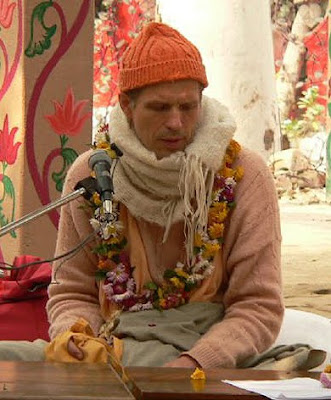
 Today's, 1st September 2013, front page of BBC news online, carries this nice article for Iskcon
Today's, 1st September 2013, front page of BBC news online, carries this nice article for Iskcon  In Venezuela, Havi approached the conductor of the Venezuelan Symphonic Orchestra Tulio Cremisini, who had previously worked as recording engineer on Havi’s Latin Grammy-winning “Tesoros de la Musica Venezolana.” The two had been planning to work on a Spanish language orchestral project. But now, Havi had a different plan.
“Forget about that -- listen to this!” he told Cremisini.
It wasn’t long before the conductor fell in love with Havi’s idea to set ancient Sanskrit and Bengali prayers by Vaishnava saints to symphonic orchestral music.
In Venezuela, Havi approached the conductor of the Venezuelan Symphonic Orchestra Tulio Cremisini, who had previously worked as recording engineer on Havi’s Latin Grammy-winning “Tesoros de la Musica Venezolana.” The two had been planning to work on a Spanish language orchestral project. But now, Havi had a different plan.
“Forget about that -- listen to this!” he told Cremisini.
It wasn’t long before the conductor fell in love with Havi’s idea to set ancient Sanskrit and Bengali prayers by Vaishnava saints to symphonic orchestral music. 
 Blissful faces during Shri Krishna Janmashtami celebrations in Iskcon Moscow Temple
Blissful faces during Shri Krishna Janmashtami celebrations in Iskcon Moscow Temple  Even on an empty stomach, Shyamala Kishori was full of energy. The gold paint sparkled on her forehead in the afternoon sun as she stood on the Plaza of the Americas on Wednesday. She was fasting in observance of Janmashtami, an annual Hare Krishna celebration
Even on an empty stomach, Shyamala Kishori was full of energy. The gold paint sparkled on her forehead in the afternoon sun as she stood on the Plaza of the Americas on Wednesday. She was fasting in observance of Janmashtami, an annual Hare Krishna celebration  Bhaktivedanta Manor's 2013 Sri Krishna Janmashtami celebrations, being the 40th anniversary of Sri Sri Radha-Gokulananda's installation.
Bhaktivedanta Manor's 2013 Sri Krishna Janmashtami celebrations, being the 40th anniversary of Sri Sri Radha-Gokulananda's installation.




 Each year, the Bhaktivedanta Book Trust publishes a limited number of copies of a Vyasa-puja book—a collection of homages to Srila Prabhupada from devotees and temples all over the world. Srila Prabhupada's unique position as the founder-acharya of the International Society for Krishna Consciousness (ISKCON) is significant in numerous ways. Essentially, he is the instructing spiritual master for everyone within ISKCON
Each year, the Bhaktivedanta Book Trust publishes a limited number of copies of a Vyasa-puja book—a collection of homages to Srila Prabhupada from devotees and temples all over the world. Srila Prabhupada's unique position as the founder-acharya of the International Society for Krishna Consciousness (ISKCON) is significant in numerous ways. Essentially, he is the instructing spiritual master for everyone within ISKCON 
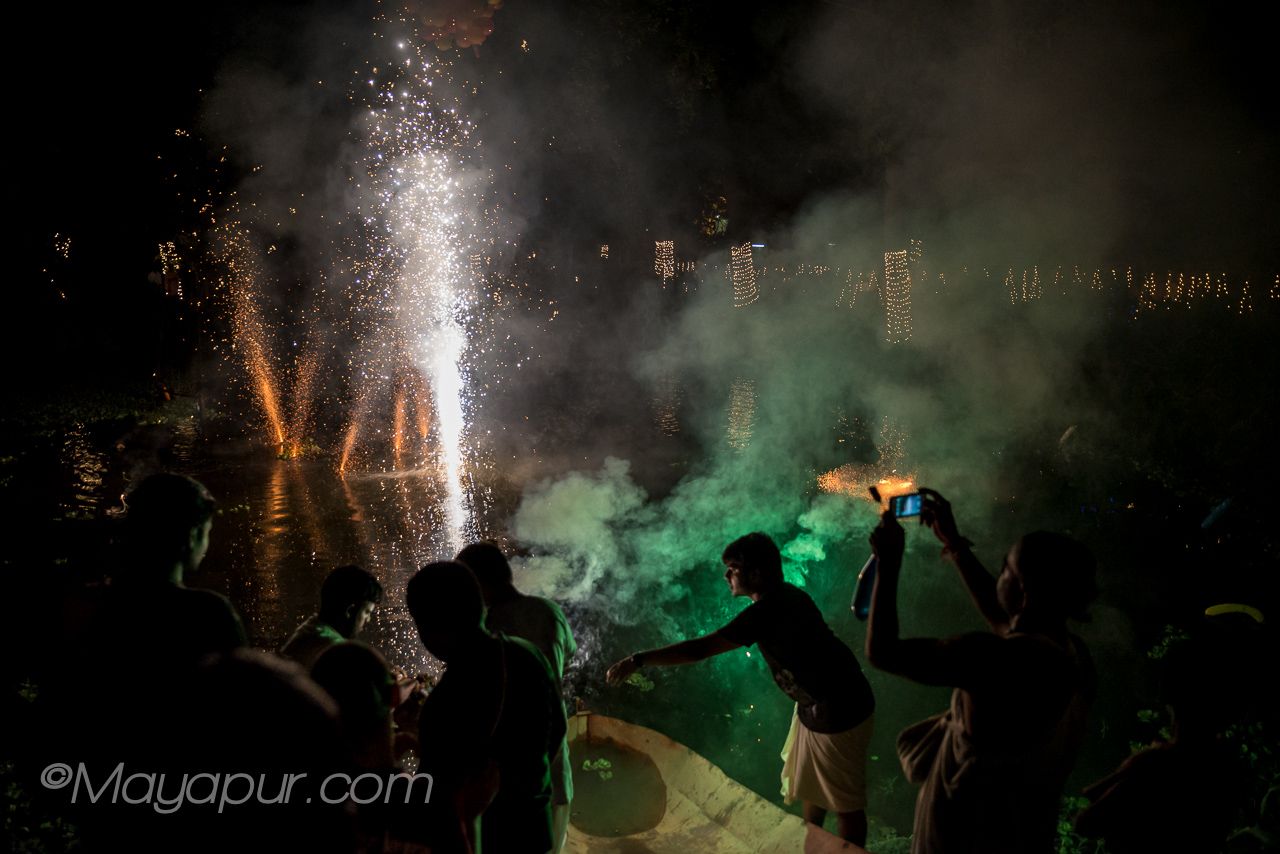 It was a grand celebration where Sri-Sri Radha-Madhava were carried in Harinam procession by bullock cart from the temple to the gorgeously decorated gardens near Goshala. The atmosphere was charged with devotion, in which I instantly felt myself being transferred to the spiritual world.
It was a grand celebration where Sri-Sri Radha-Madhava were carried in Harinam procession by bullock cart from the temple to the gorgeously decorated gardens near Goshala. The atmosphere was charged with devotion, in which I instantly felt myself being transferred to the spiritual world. 